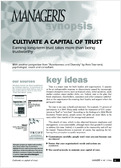Protecting your company's reputation

A number of the world's leading companies have been taken aback following unexpected attacks by NGO. How to keep this from happening to your organization and optimize your relations with NGO?
Non-governmental organizations (NGOs) have been increasingly active in the past twenty years. Many multinationals have been vilified by the media or boycotted for acting “irresponsibly,” e.g. failing to respect the environment, creating a public health hazard, ignoring labor conditions in developing countries, practicing discrimination, etc. Activist campaigns have dealt serious blows to companies like Nike, Coca-Cola, Shell, Total-FinaElf, Mitsubishi and many others.
There are two underlying reasons for this growing trend. First, globalization and the apparent omnipotence of multinationals have fostered the development of a counter-movement by activist groups. Second, information now circulates at lightning speed on the Internet, making it quick and easy to organize global-scale protests at very low cost.
A tarnished image is a significant risk for most large corporations. “Corporate Diplomacy” provides a pragmatic approach to managing this risk. Among the suggestions offered, we found the following three messages to be particularly insightful:
– No major corporation is completely safe from NGO attack.
– To anticipate potential crises, companies must learn to consider decisions from the viewpoint of the public and NGOs.
– To minimize risks, companies must be aware of their vulnerability, communicate on their efforts, and consider collaborating with NGOs.
SubscriberSign in
to download
the synopse (8 p.)
VisitorI want to buy
this synopsis (8 p.)
VisitorI want
to subscribe
See also

Cultivate a capital of trust
Being trustworthy is not enough to inspire trust. To maintain good relationships, companies must continuously cultivate their trust capital.

Building a resilient brand
Some brands are capable of developing a type of resilience. Although they cannot avoid crises, they know how to bounce back in adversity thanks to their privileged relationship with a core set of loyal customers. How do they go about it?

![Manager les situations difficiles [Managing delicate situations]](images/ouvrages/l/2254.jpg)

